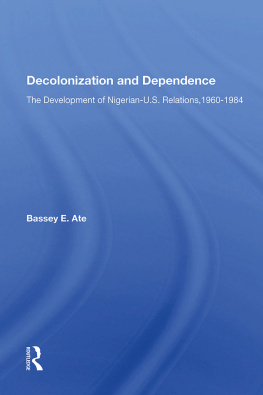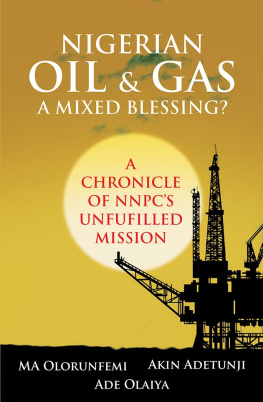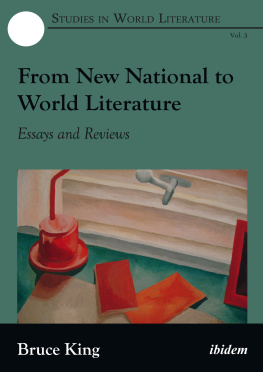Decolonization and Dependence
About the Book and Author
After Nigeria's independence from British rule in 1960, the United States emerged, rather dramatically, as the most dynamic component in the determination of postcolonial Nigerian foreign, economic, and political policies. This book, the first definitive analysis of the emergent relationship between these two countries, examines the problematic development of this connection in the context of the twin challenges of the contemporary African situation: decolonization and dependence on the capitalist world economy.
From the Nigerian perspective, the evolving relationship has been determined above all by the combined requirements of domestic political security, economic advancement, and a perceived leadership obligation in the regional decolonization movement. The author claims that for the United States, mediation in Africaa role greatly augmented by the complementary resources of the former British colonial poweris a function of U.S. interest in preserving the very colonial order Africans seek to transform. This interest has grown in the face of the Soviet challenge to Western dominion in Africa.
Dr. Ate juxtaposes the bilateral (largely economic) and regional (political) levels of Nigerian-U.S. ties to offer a structurally coherent explanation of the purpose and results of the relationship for the two countries.
Bassey E. Ate, a graduate of Harvard and Columbia universities, is a senior research fellow at the Nigerian Institute of International Affairs.
Decolonization and Dependence
The Development of Nigerian-U.S. Relations, 19601984
BasseyE.Ate

First published 1987 by Westview Press, Inc.
Published 2021 by Routledge
605 Third Avenue, New York, NY 10017
2 Park Square, Milton Park, Abingdon, Oxon OX14 4RN
Routledge is an imprint of the Taylor & Francis Group, an informa business
Copyright 1987 by Taylor & Francis
All rights reserved. No part of this book may be reprinted or reproduced or utilised in any from or by any electronic, mechanical, or other means, now known or hereafter invented, including photocopying and recording, or in any information storage or retrieval system, without permission in writing from the publishers.
Notice:
Product or corporate names may be trademarks or registered trademarks, and are used only for identification and explanation without intent to infringe.
Library of Congress Cataloging-in-Publication Data
Ate, Bassey E.
Decolonization and dependence.
(Westview special studies on Africa)
Bibliography: p.
Includes index.
1. United StatesForeign relationsNigeria.
2. NigeriaForeign relationsUnited States. I. Title.
II. Series.
E183.8.N6A84 1987 327.730669 85-22544
ISBN 0-8133-7137-6
ISBN 13: 978-0-3670-0582-5 (hbk)
ISBN 13: 978-0-3671-5569-8 (pbk)
DOI: 10.4324/9780429035685
To the memory of my father,
Ate Eyo Ate,
who instilled in me the value of
higher learning
Contents
- 1 Decolonization in African Politics: The Opening Phase
- Conceptions of African Decolonization
- Decolonization and Regional Alignments: Internal and Global Dimensions
- Nigeria and African Decolonization
- Synthesis: Decolonization and Dependency
- Notes
- 2 The Bases of Nigeria's Foreign Economic and Political Relations: 1960-1961
- The Essential Features of the Colonial Economy
- The National Development Plan, 1962-1968
- State Interests and External Dependence
- Particularistic Commitment by Strata in the Political Class
- The Significance of the Anglo-American Nexus
- Summary
- Notes
- 3 The Emerging Structure of Bilateral Dependence: 1960-1966
- Foreign Aid and Technical Assistance
- The Diplomatic-Political Dimension: The Anti-Soviet Logic
- The Psychology of Dependence and Policy Behavior
- Summary
- Notes
- 4 Regional Policy Relationship: The Necessity for Moderation and Cooperation
- THE CONGO CRISIS, 1960-1964
- The First Foreign Policy Test
- The Pattern of Nigerian-U.S. Cooperation in the Crisis
- THE CHALLENGE OF GHANA AND THE ASSASSINATION OF SYLVANUS OLYMPIO
- The Conflict with Ghana: Domestic and Regional Factors
- The U.S. Reaction to the Nigeria-Ghana Conflict Relationship: The Effect on Nigeria's Response
- The Togo Insurrection and Nigeria's Insecurity
- Nigerian Diplomacy in the Togo Affair via the IAMO
- Wachuku's Military Option and U.S. Ambivalence
- Summary
- Notes
- 5 The Changing Bilateral Structure, 1967-1976: Political Economy of War and Oil
- The Significance of the Nigerian Civil War, 1967-1970
- The State of the Economy and Ties with the United States, 1970-1976
- The Politicization of Economic Issues
- Summary
- Notes
- 6 Regional Policy Relationship: Straining for Independent Leadership
- The Essence of the New Pattern
- Postwar Ties with the Soviet Union: Their Meaning and Extent
- The Rhodesian Conflict: UN Sanctions and the Byrd Amendment, 1971-1973
- The Angola Crisis, 1975-1976
- Summary
- Notes
- 7 The Promise of a Partnership: Obasanjo and Carter, 1977-1979
- The Philosophical Premise of Carter's Policy
- Resilience of the Bilateral Structure
- U.S.-Nigerian Partnership in Regional Affairs
- Summary
- Notes
- 8 Retrogression: Shehu Shagari and Ronald Reagan, 1980-1983
- The Return of Cynicism
- Reverses in the Bilateral Structure
- Regional Leadership Under Siege
- Shagari and Reagan, 1980-1981
- Policy Convergence on Libya, Chad, and Southern Africa
- Reagan's Approach Versus Carter's Approach
- Summary
- Notes
- 9 Conclusion
- Recapitulation
- The Promise of Buhari
- Future Prospects in Nigerian-U.S. Relations
- Notes
- .
- 1 Decolonization in African Politics: The Opening Phase
- Conceptions of African Decolonization
- Decolonization and Regional Alignments: Internal and Global Dimensions
- Nigeria and African Decolonization
- Synthesis: Decolonization and Dependency
- Notes
- 2 The Bases of Nigeria's Foreign Economic and Political Relations: 1960-1961
- The Essential Features of the Colonial Economy
- The National Development Plan, 1962-1968
- State Interests and External Dependence
- Particularistic Commitment by Strata in the Political Class
- The Significance of the Anglo-American Nexus
- Summary
- Notes
- 3 The Emerging Structure of Bilateral Dependence: 1960-1966
- Foreign Aid and Technical Assistance
- The Diplomatic-Political Dimension: The Anti-Soviet Logic
- The Psychology of Dependence and Policy Behavior
- Summary
- Notes
- 4 Regional Policy Relationship: The Necessity for Moderation and Cooperation
- THE CONGO CRISIS, 1960-1964
- The First Foreign Policy Test
- The Pattern of Nigerian-U.S. Cooperation in the Crisis
- THE CHALLENGE OF GHANA AND THE ASSASSINATION OF SYLVANUS OLYMPIO
- The Conflict with Ghana: Domestic and Regional Factors
- The U.S. Reaction to the Nigeria-Ghana Conflict Relationship: The Effect on Nigeria's Response










